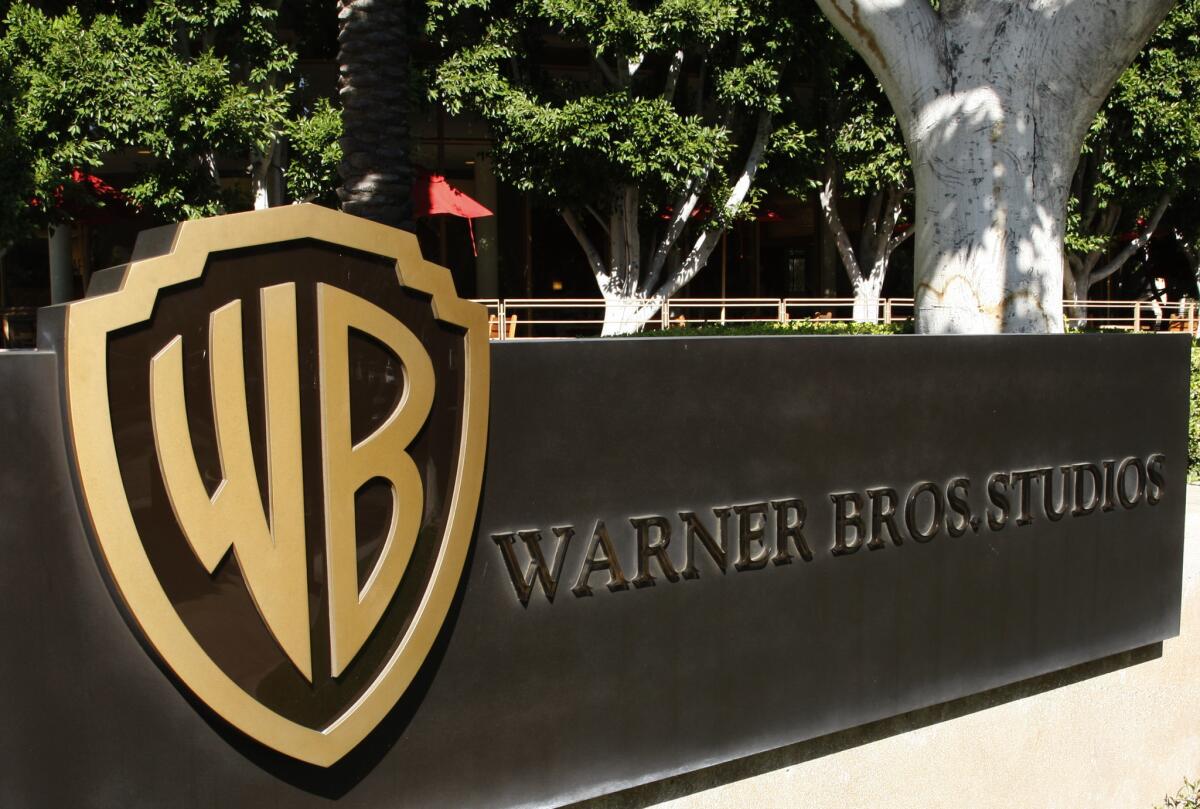Upended by the coronavirus and competing streamers, WarnerMedia slashes 600 workers

- Share via
WarnerMedia began slashing its workforce Monday, laying off at least 600 employees as movie theater shutdowns and streaming competition ravage its film and TV business.
The bulk of the job cuts came from the legendary Warner Bros. studio in Burbank, known for “Wonder Woman,” “The Big Bang Theory” and the Harry Potter movie franchise. High-level studio executives ousted were Ron Sanders, Warner Bros. motion picture distribution chief; Jeffrey Schlesinger, worldwide television distribution chief; and Kim Williams, the studio’s chief financial officer.
The purge comes amid a period of turmoil for the media company, which was acquired by telecommunications giant AT&T two years ago. The reorganization is the second management shakeup since the Dallas firm took control. Since then, COVID-19 stay-at-home orders have upended the movie business, and major studio releases, including Christopher Nolan’s highly anticipated sci fi thriller “Tenet,” have been delayed. Analysts say U.S. box office receipts this year could be down as much as 70% compared with last year. Plans now include releasing “Tenet” overseas before a hoped-for September debut in the U.S.
The pandemic also prompted a temporary shutdown of TV and film production, which means there are fewer projects in the pipeline, further eroding revenues.
The company’s hoped-for silver bullet — its HBO Max streaming service — has gotten off to a sluggish start.
While 26 million HBO subscribers have access to HBO Max, the service had notched only 4.1 million subscribers by the end of June. The company assured investors that 10 million subscribers would have HBO Max at its May launch. In contrast, more than 10 million consumers have downloaded the app for Peacock, a competing streaming service that NBCUniversal launched last month.
WarnerMedia CEO, Jason Kilar, who joined the company in May, is looking to streamline the organization. On Friday, he surprised Hollywood by ousting two top TV programmers: Bob Greenblatt, who was chairman of WarnerMedia Entertainment, including HBO; and Kevin Reilly, who was chief content officer for HBO Max and programming head of the Turner channels. Greenblatt had been in his position only 18 months; he was hired last year by John Stankey, now chief of AT&T, to oversee the company’s TV channels, including HBO, and the HBO Max service.
“Kilar is following the Wall Street-driven mandate to get efficiencies,” said Eric Schiffer, CEO of Beverly Hills private equity firm the Patriarch Organization. “We are seeing the excruciatingly painful, yet a strategic, refocusing of the company to achieve that aim.”
In addition to running Hulu, Kilar was previously an executive at Amazon.
Television channels, including HBO, also shouldered some of the cuts.
WarnerMedia’s reorganization erased a decades-old structure, in which its TV networks and Hollywood studio operated as two distinct units. Last week, NBCUniversal centralized management of its TV vast portfolio and began substantial layoffs.
As part of the consolidation, Warner Bros. CEO Ann Sarnoff, HBO Chief Casey Bloys and Chief Enterprise Inclusion Officer Christy Haubegger got substantial promotions.
AT&T is struggling to realize the potential of its high-profile investments in the last five years, takeovers that left the company burdened with more than $160 billion in debt. In 2015, the company acquired DirecTV, which then witnessed an exodus of top executives. The satellite TV operation has since lost more than 4 million subscribers. Last month, AT&T notified California officials it was planning to permanently cut another 64 employees from its operations in El Segundo.
“They spent nearly $50 billion on DirecTV, and that became a fiasco, and then they spent $85 billion on Time Warner, and while it’s not a fiasco, it could be heading in that direction,” said Jeffrey Cole, a USC communications professor and director of the Center for the Digital Future. “This is the new guy coming in and cleaning house. But it is also a recognition that the place was a mess. Morale has been destroyed, and they looted the HBO brand for their HBO Max streaming service — and they didn’t even do that successfully.”
Additionally, WarnerMedia’s cable networks — TNT, TBS and Cartoon Network — have been reeling amid changing consumer viewing habits. The company no longer can depend on couch-potato viewing as consumers instead watch entertainment on Netflix, Hulu, YouTube and TikTok.
Both Sanders and Schlesinger had been with the Burbank-based studio for more than 30 years. Schlesinger, who began with a Warner Bros. predecessor company in 1983, had survived five previous mergers.
“It’s been a great 37-year run, with 26 as president of International Television Distribution, spanning six mergers, millions of miles traveled, thousands of programs sold and billions of dollars generated,” Schlesinger said in a statement. “In the end, it took a global pandemic and a complete reorganization of the company for me to trip over the last hurdle. I hope to always be remembered as the only studio executive to ride into an International Screenings party at the studio on the back of an elephant in the ‘good old days.’”
Sanders said: “Warner Bros. is known for being the most celebrated studio in history for good reason. The talent is unmatched, both on the creative and business sides, and I’m honored to have been entrusted to oversee a great portfolio of businesses around the world for the last 30 years.”
Williams, in the statement, said she would “cherish” her five years at the studio, which she said was “filled to the brim with the best and brightest.”
More to Read
Inside the business of entertainment
The Wide Shot brings you news, analysis and insights on everything from streaming wars to production — and what it all means for the future.
You may occasionally receive promotional content from the Los Angeles Times.











